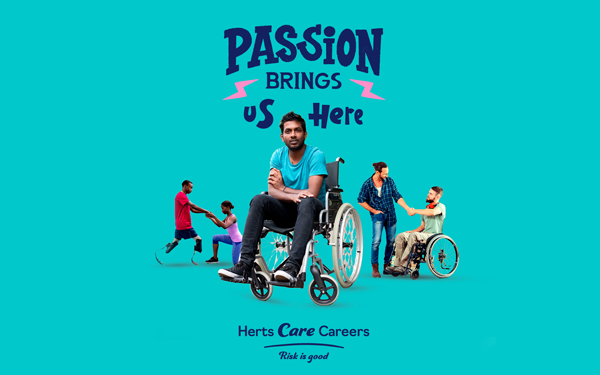Risks – and our right to take them – are things that most of us take for granted, and that contribute to fulfilling lives.
However, for many disabled and older people, risk is often stripped out of their lives, typically in the name of safety, but too often to suit the needs of the organisations and professionals who work with them.
Not so in Hertfordshire – where social workers and other social care staff embrace and promote risk for the people they support. The result: more fulfilled, meaningful and independent lives for disabled and older people, and for staff, the greater professional satisfaction that comes with working in a way that is in tune with their values.
Doing things differently
“We do things differently here,” says Hertfordshire County Council’s director of adult care services Chris Badger. “We want to support people to have happy, fulfilling lives that are built around enjoying risk, seeing risk as a good thing. That might be doing enjoyable, outward-bound activities, challenging people to do things they’ve never done before, taking risks in social environments – but all in a way that supports that person to have as independent and as positive a life as possible.”
Mark Harvey, the council’s operations director for adult disability, adds: “Our social workers, our nurses, our professionals work alongside people to be able to get care and support plans that mean they can go to work, they can have relationships, they can have a good time but they can also contribute to society and really be the citizens and neighbours we all want to be on a daily basis.”
Case study: ‘Risk taking is integral to our role’
Tanya, a senior occupational therapist, says: “I worked with a lady, who lived in supported living, and despite having complex needs; including a learning disability and epilepsy, was able to transfer independently. However, she’d had three seizures in five weeks and a decision was made by the home and the GP to hoist her for all transfers, to raise bed rails at night (to prevent her from getting out of bed to use the toilet) and put continence pads on her despite her not being incontinent.
“This was practice that she hated and kept asking not to be hoisted and for the rails to be left down at night since she also hated wearing continence pads. This situation was debilitating for her and impacted negatively on her mental health.
“The outcome of my assessment concluded, that whilst her transfers were not totally safe, she had adopted a way of managing and had mastered her own way to achieve independent transfers.
“The importance here, was that she demonstrated mental capacity to choose how she wanted to be transferred; it is then our duty to support and advocate, even if it’s an “unwise” decision, since she knew herself better than anyone, she was the expert of herself and not the professionals around her. Following my assessment and recommendations, the hoist was taken away, the bed rails removed, and she was free to use the toilet during the night.
“Risk taking is integral to our role. You have to put yourself out there to challenge situations and, as an occupational therapist, I’m not afraid to open cans of worms to bring about change or if I think something is wrong or unjust.”
Making connections
At the root of Hertfordshire’s approach is its Connected Lives model. Launched in 2018, it sets maximising people’s independence and citizenship as the ultimate aim of adult social care services, with every contact between staff and the people they support being strengths-based and risk positive.
As the name suggests, the focus of the model is on connections – between people who need care and support and family, friends and groups with similar interests, whether face-to-face or through technology.
The model, which the council describes as relationship-based, theoretically-grounded and theoretically-informed, is also one that puts trust in social workers to practice autonomously by reducing form filling, slimming down processes and reducing the need for management sign-off. And the model isn’t just one that applies to county council staff, but to providers themselves, who the authority supports to embed the approach through its commissioning practices.
Wesley, head of operations at Hertfordshire Care Providers Association, says: “Good, positive risk helps people be independent. People may want to go swimming, or go to the pub or the football, and why shouldn’t they do that, regardless of disability or ability? By supporting people to take good, positive risks, we can enable people to live really independent lives.”
‘I rarely go in with a form or pad’
Esperanza, a community nurse, who supports young adults with learning disabilities, says: A lot of cases are hard because the person can’t always articulate what they’re thinking and they might not understand why you’re there. But it’s about hanging in, and being there for them. I don’t like the word “service user”. They’re people. I like to listen to them, notice the little clues, find out what they want, and be in tune with them…I rarely go in with a form or pad, I talk to people normally, and if I’m relaxed then they will be relaxed.”
Hertfordshire’s ethos comes with ample opportunities to develop your career through the high-quality supervision and learning and development offer that the council offers in adult social care.
One of those benefiting is Ravali, a community care officer currently in the second year of a social work apprenticeship.
She says that, though she is “accountable for every decision I make”, she is “never hesitant to seek the help I need”.
“Having great managers, who are there to support you is very important and that’s what I’ve had here at Hertfordshire County Council from the start.”
For more information on working in adults’ services in Hertfordshire, see:
- ‘I find what I do rewarding and it really comes to life when you’re doing it’
- ‘A role in which every day matters’: how discharge to assess is transforming outcomes for people and job satisfaction for practitioners
Are you interested in working in Hertfordshire? See the latest vacancies here, and find out more at Herts Care Careers.




 Facebook
Facebook X
X LinkedIn
LinkedIn Instagram
Instagram